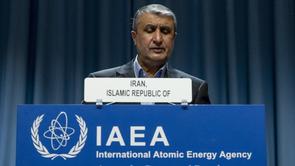 Chief of the Atomic Energy Organization of Iran Mohammad Eslami looks down as he delivers a speech during the International Atomic Energy Agency General Conference, an annual meeting of all the IAEA member states, at the agency's headquarters in Vienna, Austria on Sept 20, 2021. (JOE KLAMAR / AFP)
Chief of the Atomic Energy Organization of Iran Mohammad Eslami looks down as he delivers a speech during the International Atomic Energy Agency General Conference, an annual meeting of all the IAEA member states, at the agency's headquarters in Vienna, Austria on Sept 20, 2021. (JOE KLAMAR / AFP)
TEHRAN - The head of Atomic Energy Organization of Iran Mohammad Eslami on Tuesday rejected a US statement which calls for giving access to the inspectors of the International Atomic Energy Agency to visit Iran's Karaj nuclear site, official IRNA news agency reported.
Eslami said upon his arrival in the Russian capital Moscow that the countries, which did not condemn the "terrorist act" against Iran's Karaj nuclear site, are not eligible to comment on inspections there.
We agreed (for the International Atomic Energy Agency) to replace the memory cards of the specified cameras at the request of the agency, and it is clear that it does not include areas damaged by the terrorist act; we addressed this issue in Tehran statement and told them in Vienna.
Mohammad Eslami, the head of Atomic Energy Organization of Iran
ALSO READ: Iran says nuclear talks to resume 'very soon,' gives no date
The IAEA on Sunday said that its inspectors had been denied access to a centrifuge manufacturing site in Karaj city, 40 km northwest of Iran's capital Tehran. According to Iran, the site was attacked by Israel in late June.
Based on Sept 12 agreement between Iran and the IAEA in Tehran, "we agreed (for the IAEA) to replace the memory cards of the specified cameras at the request of the agency, and it is clear that it does not include areas damaged by the terrorist act. We addressed this issue in Tehran statement and told them in Vienna," Eslami was quoted as saying.
Eslami noted that Iran will not accept their insistence on installing cameras in places damaged by the terrorist operation.
He also urged the IAEA to end what he called "its discriminatory and political" attitude toward the Islamic Republic, which has been a member of the agency for 50 years.
READ MORE: Iran nuclear chief: Time for US to revise policies, lift sanctions


